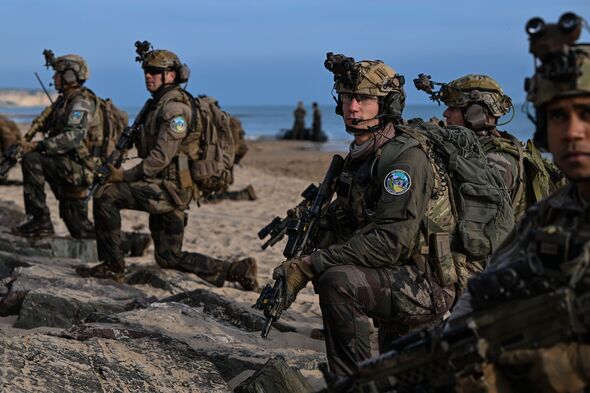A senior NATO general has confirmed the security alliance has drawn up plans for dealing with a “large scale” of wounded troops in a war with Russia.
Lt Gen Alexander Sollfrank, the head of the alliance’s logistics command, said NATO was looking at how to transport a large number of wounded troops away from the frontlines during a brutal war with Vladimir Putin’s regime. The detailed planning of an all-out war comes amid growing tensions between the two sides over Ukraine.
Speaking to Reuters, General Sollfrank outlined the chaotic first days of a war with Russia, as he suggested that Russian fighter jets could try to take out planes evacuating wounded NATO soldiers.
Outlining what the initial phase of the war would look like, the German military commander said that the Western militaries would likely be faced with a much larger war zone and a higher number of injured troops than they are experienced in dealing with.
The NATO general also said the alliance would have to suffer a temporary lack of air superiority close to the frontlines.
He added that a war with Russia, along a huge frontline, would be different from the experiences in Afghanistan and Iraq.
General Sollfrank explained: “Air superiority will have to be achieved in the first place.
“It will require time to succeed over the entire length and depth of the frontline.
“For planning reasons, all options to take a great number of wounded to medical installations need to be considered, which includes trains but potentially also buses.”
He explained that hospital trains could transport more casualties at the same time compared to air evacuations.
Speaking to Reuters, the German general did not specify how many injured troops NATO expects to suffer in the initial days of the war.
However, he suggested that NATO officials had explored the issue of medical evacuations during an all-out war with Russia in great detail.
General Sollfrank added: “The challenge will be to swiftly ensure high-quality care for, in the worst case, a great number of wounded.”
The German military official runs NATO’s Joint Support and Enabling Command (JSEC), which recently held an exercise to coordinate patient flows during a major conflict.
In his interview with Reuters, he also said that war would Russia would require a ‘military medical Schengen’ in the EU – similar to the political Schengen zone, which allows free movement within most of the EU.
The NATO general said that sensitive medications like narcotics and strong painkillers to treat wounded troops should be able to move across borders without significant checks or delays.
In June this year, the German defence minister said that Europe had to be ready for war with Moscow by 2029.
At the time, Boris Pistorius said: “We must not believe that Putin will stop at Ukraine’s borders.”
